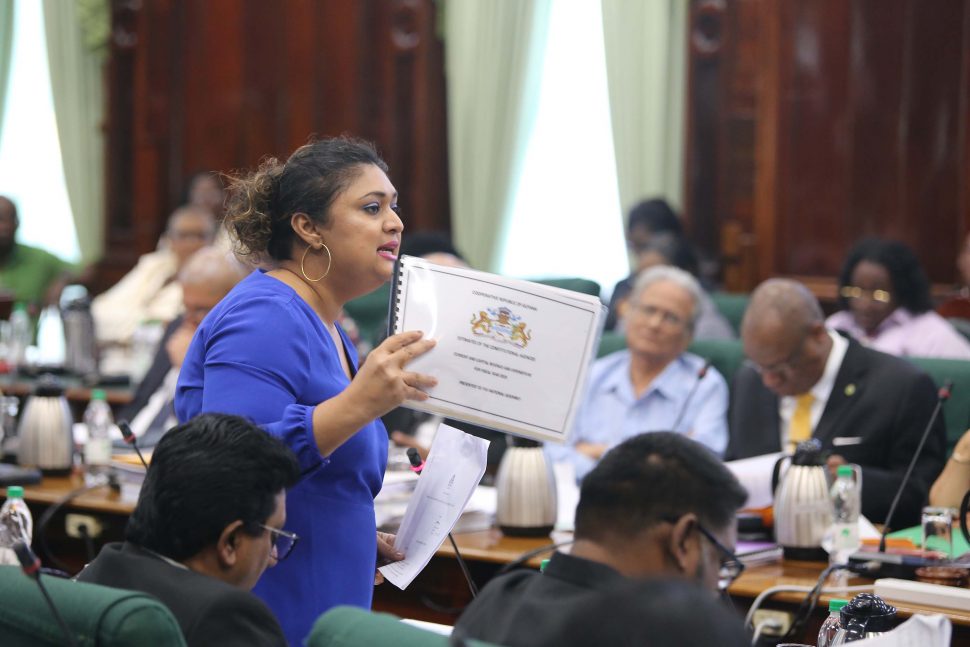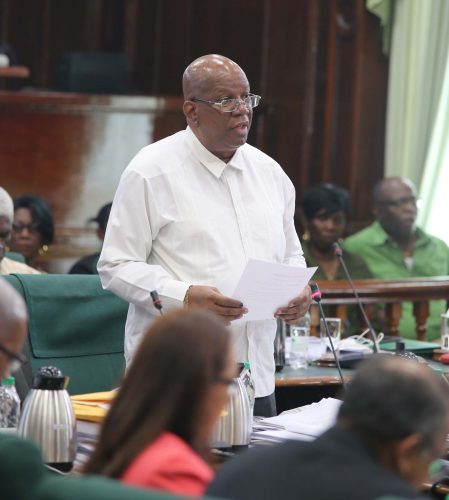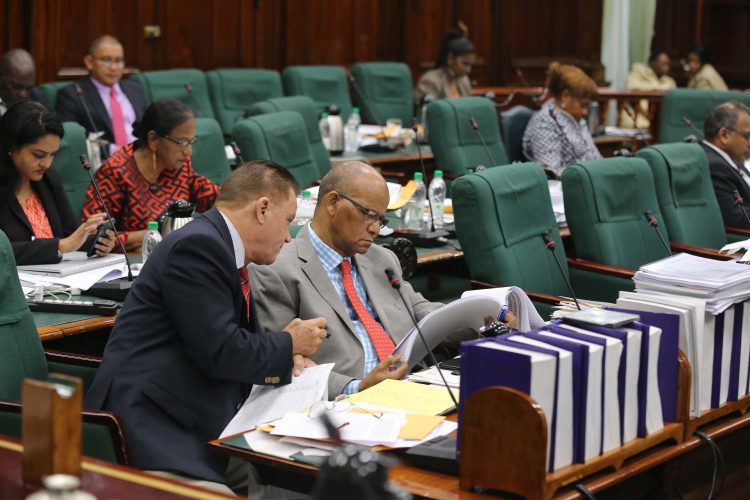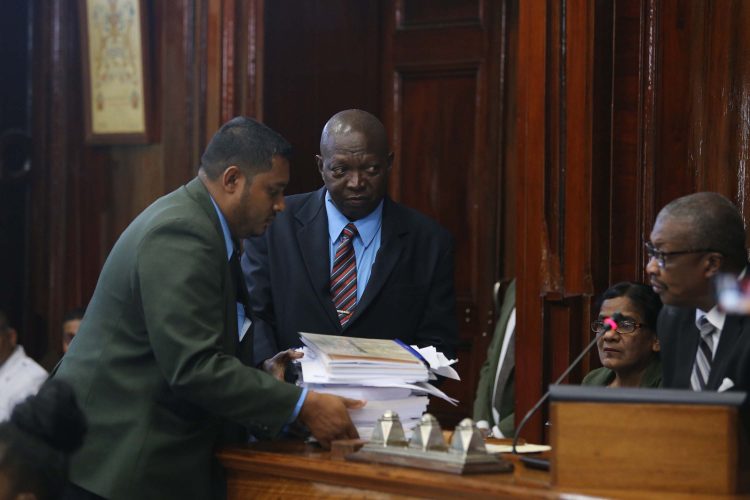Consideration of the budgetary allocations for 16 constitutional agencies was yesterday delayed for five hours while the House struggled to provide the opposition with copies of the budgets as submitted to the Clerk. At the end of the delay the agencies received lump sum allocations totaling more than $11 billion.
For the last three years the lump sum allocation for these agencies has been considered and passed separately from the regular budget in keeping with a 2015 amendment to the Fiscal Management and Accountability Act (FMAA) which granted these agencies financial autonomy. The House during the years 2016 to 2018 examined only the lump sum requested by the agencies and Finance Minister Winston Jordan’s recommendation.
This year however a decision by the Business Sub-committee of the Committee of Supply to cut the time allocated for debate to 2 hours 40 minutes rather than the five hours previously allowed was met with loud dissent from Opposition Chief Whip Gail Teixeira.
Teixeira argued that the constitution provides for the National Assembly to review the budgets themselves rather than respond to the Minister’s recommendations and 2 hours 40 minutes was just not enough.
“We have to be allowed as legislators to exercise our reasoning abilities to examine the expenditure… procedures don’t trump our constitution. It is obscene…the constitution of our country guides us, Article 222A (a) says the expenditure of each entity shall be financed as a direct charge on the consolidated fund determined as a lump sum by way of an annual subvention by way of the National Assembly after review,” she reminded stressing that “after review” shows clearly that these budgets must be subject to the review of the House.
Fellow Opposition Parliamentarian, Juan Edghill further invoked the FMAA noting that rather than the documents as submitted to the clerk the House had been presented with the Minister’s recommendation.
The FMAA specifically directs at 80B(1) that the public officer responsible for managing the affairs of an Agency…shall submit budget proposals to the Clerk of the National Assembly…who shall ensure that those proposals are submitted as presented.
“The Minister had the opportunity to read the accompanying note submitted… the law requires that however the agency submits its budget that is the way it should be circulated,” Edghill stressed before requesting that the requirement be fulfilled.
Speaker, Dr Barton Scotland attempted to point out that the request covered a large set of documents and would take a significant amount of time to be copied for distribution and asked that the House proceed with its business.
This request did not find favour with Opposition Parliamentarian Priya Manickchand who argued that those documents were the business of the house.
She reminded the House that the opposition had requested these documents since November 1, 2018 at 1:30 am.
Entitled
“We asked for it. We are entitled to it…. if we are to represent the people of this country we have to see the submissions made,” she stressed proposing that the sitting be delayed until members had before them the documents submitted to the House by the 16 agencies.
The House was therefore suspended for a meeting of the subcommittee to decide the way forward. Two hours later the session recommence and was immediately adjourned for one hour.
Following the adjournment there was delay for another hour while the Parliament Office struggled to send the documents via electronic mail.
Eventually the House resolved itself into committee and began consideration of the estimates.
The next four hours were consumed with what Scotland had earlier described as a meeting between an “unstoppable force and an immovable object.”
For the third year in a row Teixeira attempted to ascertain the methodology used by Jordan to allocate particular sums and received as a response “fiscal space”
A frustrated Teixeira resorted to her refrain of “capriciousness, nothing but capricious” .
“What is his rationale? Is he playing chic chic? Is he just throwing the dice like the chic chic man? We are asking him for rationale and he is repeating ad nauseam his stock answer.
This year the Minister chose to respond to each query with the explanation that “the recommended allocation takes into account the economic outlook for 2019 for revenue, expenditure, growth in the economy, consideration of the Agency’s request within national development priorities and annualisation of salaries.”
Last year’s refrain was “the recommended allocation takes into account the macro-economic outlook for 2018 for revenue, expenditure and growth in the economy, challenges in implementation encountered in 2017 and annualisation of salaries.”
At the end of eight hours the 16 agencies which had requested a total in excess of 13 billion had received $11,446,163,000.
Parliament had for 2019 requested a budget of $1,845,416,000, a $300,000,000 increase from the $1,578,100 received in 2018 and $100,000,000 more than the $1,739,832 requested in that same year. Government has granted 1,700,271,000.
The Audit Office had requested $894,241,000, slightly more than the $844,422,000 requested in 2018 and $100,000,000 more than the $783,876,000 allocated. They have received $872,009,000 with Minister Jordan assuring that the lower allocation would not affect their ability to build the capacity needed to appropriately monitor the emerging oil and gas sector.
Meanwhile the Guyana Elections Commission had requested $6,368,100,000, a significant increase over the $3.7 billion requested in 2018 and the $2.9 billion allocated. The increase is expected to cover a new national house-to-house registration exercise to produce a new national electoral register ahead of the 2020 general elections. They have received $5,371,061,000.
The constitutional agencies considered are as follows:
Parliament Office
Office of the Auditor General
Public and Police Service Commission
Teaching Service Commission
Guyana Elections Commission
Supreme Court
Chambers of the Director of Public Prosecutions
Office of the Ombudsman
Public Service Appellate Tribunal
Ethnic Relations Commission
Judicial Service Commission
Indigenous People’s Commission
Human Rights Commission
Rights of the Child Commission
Women and Gender Equality Commission
Public Procurement Commission












